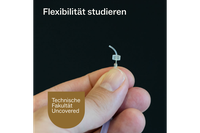Prof. Edoardo Milana in interview
In our series "Technische Fakultät Uncovered", we introduce a professor of the Faculty of Engineering of the University of Freiburg every week. The professors provide exciting insights into their work as scientists and teachers and even reveal one or two secrets about themselves.
Prof. Edoardo Milana is professor at the Department of Microsystems Engineering and head of the Soft Machines Laboratory.
- What do you associate with microsystems engineering?
The president of IBM predicted in 1943 that there would have been a market for circa five computers. It is hard to find another example of how a prediction turned out to be so enormously wrong. Today there are billions of computers in the world, and this extraordinary achievement is due to the very rapid development of microsystems engineering.
What makes this discipline exciting right now are the potential new applications beyond microelectronics, from biomedical devices, to microrobotics, via programmable and smart materials.
In addition, we have examples all around us all the time of how nature has evolved into organisms that have functionality at different scales, from molecules to tissues via cells, and this synergy of nano-, micro-, and macro-systems is an outstanding source of inspiration for the development of new sustainable, high-performance technologies.
- What is your main field of research and why is it so exciting for you?
My main field of research is Soft Robotics, where we design and build autonomous machines using compliant and flexible materials like rubber, plastics and gels. Soft robots can safely interact with delicate objects and organisms due to their mechanical properties and are ideal candidate for applications that involve operations with inevitable human-robot contacts, such as robotic surgery, active prosthetics, elderly care and companion robots. It is exciting that soft materials can take over some of the roles traditionally played by sensors, actuators and controllers and study how artificial intelligence can be created not only at the software level but also at the hardware one.
- What do the students learn from you and which aspects are particularly important to you?
In my classes and laboratories, students learn how to create machines that are not made by an assembly of rigid components that rotates and translates, but are composed of materials that can be printed or molded and move through deformation.
We study the actuation mechanisms and the control strategies that make this possible. I find it particularly important to carefully design the geometrical structure of these machines in order to simplify control algorithms as much as possible by programming functionality directly in the physical embodiment.
- What advice would you give to students at the beginning of their studies?
It’s exciting to start a new program of studies but it may be possible to feel overwhelmed by the different engineering disciplines to be tackled. I advise the students to enthusiastically pursue what stimulates their interests and curiosity and to follow what they are passionate about, to adjust their specialization accordingly.
I also encourage the students to get involved in the research projects that are being carried out here at the Faculty of Engineering, to grasp beforehand the importance of scientific research and to enrich their knowledge base through practical activities.
- What are the career prospects for graduates?
A microsystem engineer is a highly skilled professional trained to work in cutting-edge tech companies. Job opportunities can be found in several industries, electronics, sensors, actuators, automation, but also automotive, biomedical, energy systems and materials.
Moreover, given the exceptional research environment of our faculty, the graduates have the opportunity to pursue doctoral training in outstanding and leading research groups, in the perspective of an academic career or management positions in industrial R&D settings.
- What is your motto for teaching and research?
Being a researcher in soft and compliant machines, I can truly say that my motto is “Be flexible to be adaptive!” It is an expression of wisdom to recognize the limitations of a certain technology or methodology and to be ready to explore unknown but promising alternatives. This is both valid for teaching and research, as flexibility means to be able to respond to external feedbacks to gain better performance and understanding.
In engineering, we are witnessing these transformations in energy systems and transportation, and the same will happen in robotics and materials science.
- What do you like best about the Faculty of Engineering?
The strong interdisciplinary environment of the Faculty of Engineering is a unique opportunity to grasp the core aspects of classical engineering disciplines. For example, Microsystems Engineering builds upon Mechanical, Electrical and Systems Engineering as well as Materials Science and Chemistry, therefore students are trained in all these disciplines.
Moreover, I really like that the departments are complemented by research centers such as FMF, FIT and IMBIT, where the research activities cross the faculties borders enabling collaborations between engineers, medical doctors, biologists, physicists and chemists.
- What you think students should know about you?
I am a soft robotic enthusiast, so the students should not be alarmed when I will try to convince them that squishy and deformable robots can be better in certain aspects than the cool humanoid machines that we see on youtube performing backflips and dances!
On a more personal level, I love watching and playing football and I am huge AS Roma fan, so don’t be surprised to meet me at the Europa-Park Stadium if there is a match SC Freiburg – AS Roma in the next UEFA Europa League!
Contact:
Prof. Edoardo Milana
Assistant Professor of Soft Machines
Department of Microsystems Engineering (IMTEK)
University of Freiburg
Georges-Köhler-Allee 103
D-79110 Freiburg
Cluster of Excellence livMatS @ FIT – Freiburg Center for Interactive Materials and Bioinspired Technologies
University of Freiburg
Georges-Köhler-Allee 105
D-79110 Freiburg
Office: 01.025
Phone: +49 (0) 761 203 95090
Email: milana@imtek.de
Kerstin Steiger-Merx
Representative PR/Marketing
Faculty of Engineering
University of Freiburg
Tel.: 0761/203-8056
E-Mail: steiger-merx@tf.uni-freiburg.de

